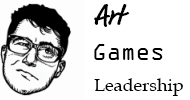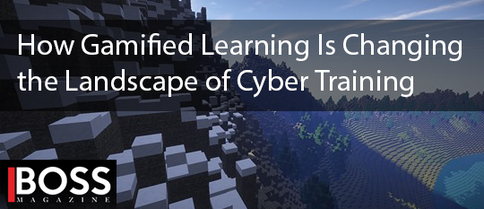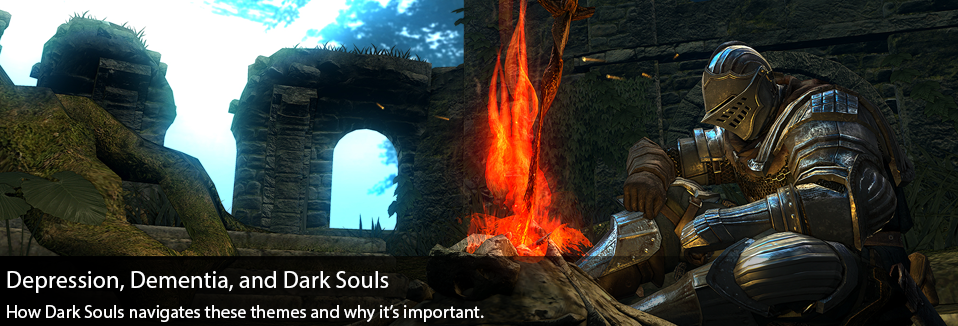|
|
Personal Projects
|
|
|
It’s really difficult to summarize the themes and meaning behind Dark Souls, and equally hard to explain why the game carries so much weight for the people who love it. Dark Souls is typically thought of as just a difficult game, and usually people can’t see past that initial hurtle… I’m not going to say that Dark Souls isn’t a difficult game, but this game isn’t like others with an “insane difficulty” setting. I’m not a masochist who likes playing games on their hardest difficulty, and yet I play the game that’s stereotypically defined as the most difficult one on the market. In today’s post I’m going to attempt to explain “Why Dark Souls is important.” I’m going to be touching on themes of mental illness, depression, and dementia within this post. While I am no expert in these themes, I’m going to make ample use of others who have spoken about these in the same manner… hopefully in a way that will better define what this game is. This is going to be a bit of a theoretical deep dive, but I’m hoping to make it as digestible as possible. The LoreTo start, we need to talk a bit more about the backstory in this game and what it represents. If you’re at all familiar with the game, you’ll know that the backstory can be just as convoluted as it’s themes but I’ll try to make this concise… When this world began it was a world of “gray,” no light or dark cycle, and was ruled by ancient dragons. One day there was a great fire that emerged, and fire brought duality to the world (light/dark, heat/cold, and life/death). Within the flame there were 4 “Lord Souls,” which are basically elements of great power. These Lord Souls represent four elements : Light, Dark, Life, and Death. Powerful beings took the Lord Souls of Light, Life, and Death… and teamed up. Meanwhile the “Dark Soul” was inherited by the progenitor of man. The beings that possessed the Light, Life, and Death soul started a war against the ancient dragons. Upon the dragon’s defeat, started the age of “Fire and Light”. Though, unknown to them, when the first flame erupted it started a new cycle for this world. It’s sort of like a pendulum where the world was no longer in gray but would sway between an era of light and then back to an era of dark. As the era of light started to fade, these beings became paranoid and fearful of losing their power and wanted to prolong the age of fire as long as possible. Desperate in their own way, each of these beings tried different methods of unnaturally prolonging the era of light. While moderately successful, these each resulted in some pretty hefty consequences to the world... one of which is the “curse of the undead.” Humans seem to be cursed to be reborn after death, yet on each rebirth they degenerate more and more… slowly leading to insanity. While the age of light persists, the world is plagued with the undead who have lost their humanity and wander aimlessly. This process is called “going hollow.” The player enters this world as one of the cursed undead and presented with the challenges of this decaying world. They must overcome insurmountable odds and in the end decide to either attempt to prolong the age, or let the age of fire naturally die and usher in the age of dark. The curse of the UndeadThis world is brutally indifferent to the player. Unlike many games, the world does not feel as though it’s centered around the player. It has its own rules and pushes back against the player at every opportunity. The Curse of the Undead is heavily present, certain enemies are feral and hostile, while others are too consumed with the anguish within their own minds to bother you… they’ve gone truly hollow. There are also characters that you meet along your journey that are fighting this curse. They are often cheerful and encouraging to the player, yet as the game progresses they start to become more forgetful, less and less of themselves, and after a while can truely go hollow. It’s easy to see the similarities of mental illness and dementia within the undead curse. I think it brings about a real fear that we all have, and struggle with. The thought of slowly losing ourselves, not being the person we once were, and effectively going hollow. “While the game is unclear what turns an Undead into a Hollow - the passing centuries of an unnaturally long life, repeated deaths and rebirths, or some other factor of the curse – but its clear that Hollowing is the inevitable fate of all Undead. Almost every character you meet bears the weight of the curse, suffering some symptom or another of the Hollowing process. And almost all of these symptoms seem suspiciously like the onset of dementia.” - Nic Rowen Nic Rowen describes this elegantly in this article, much more so than I ever could based off of my own experiences with dementia. I slowly watched my Grandfather go hollow, it was scary, incredibly sad, and truly a curse you wouldn't want anyone to endure... The hollowing process, the persistent and repeated battles, also largely represent the struggle with depression. In his video “Don't You Dare Go Hollow” Nevyn describes Dark Souls as an :
I’ve never been diagnosed with depression, yet I’ve seen good friends struggle with this. We all have our own demons, inner voices we fight against, anxiety, and some days those battles are harder than others. This struggle, this cycle, is in many ways prevalent through both the themes and the mechanics within Dark Souls. Indifference vs. SadismI want to take a brief pause here to talk a little more about this world. Up until now it likely seems like this game is purely depressing, sadistic, etc… and while this world is incredibly heavy, I want to make sure I accurately describe that this isn’t mean to just be a “Dante’s Inferno,” another weird jaunt through hell… Sadism in video games is easy, in most ways it means that everything in the world is out to get the player. While there are enemies in the world, Dark Souls specifically highlights how the world would exist without the player. It isn’t about being unnecessarily harsh and attacking the player. The experiences within the game often feel as though you’re interrupting events already taking place, rather than enemies placed specifically for “jump scares.” Also these events that you’re interrupting, don’t require the player to solve or fix… they would play out regardless. Just as in real life, you’re not the center of this universe… which is meant to make you feel small in this world… Hamish Black better describes this in his video “Dark Souls 3 : Indifference vs. Sadism.”
|
“Any progress in Dark Souls is an act of self betterment, even if it exists in a world that’s hostile and indifferent…. You don’t feel powerful or mighty having bested an enormous enemy. You feel small, you feel insignificant, but importantly you feel as though you’ve truly earned the sun shining on your face….. The goal of Blighttown is not to teach you how to best an enemy, but to teach you to appreciate the little victories. And once you have learned that, you can arguably handle anything the game throws at you.” - Hamish Black | |
While Hamish Black is describing a particular area within Dark Souls, I find it well represents the larger picture of what Dark Souls is and can be for people. Progress within Dark Souls is brought on by the player’s will to survive and strive forward. Traditional games have your character becoming more and more invincible and while your character can become quite powerful in Dark Souls, if you’re not staying on your toes… even the lowliest enemy can still take you by surprise. Victories don’t feel handed to the player, they feel earned through hardship. Through this hardship we feel as though we grow with our characters, and respond to challenges differently both in the game and outside. There are many videos and articles from players who describe Dark Souls as a way of combating or even understanding their own mental illness or depression. Nevyn goes on to say :
“There are two main ways people handle depression, and two main ways people defeat Dark Souls. Some choose to go it alone, either trusting in their own strength or simply not wanting to be a bother to others. The rest will decide to call on the help of friends or strangers, gaining strength by having those friends or strangers by their side. Those who opt for facing the challenge solo, will undoubtedly have a harder time without the support of a couple of friends….. Despite how difficult things get, each battle CAN be won and each step forward CAN be made.” -Nevyn
That’s another important feeling that Dark Souls attempts to instill in it’s players is that while things can be tough, there’s always a way to move forward. Also if the path is too difficult, perhaps you’re going about it the wrong way. Dark Souls really doesn’t spoon feed the player information, and in doing so encourages experimentation and exploration from the player. It was a real epiphany moment for me when I realized I didn’t have to “kill all the enemies” in an area. If you’re skilled enough, you can just run through.
“Playing through and overcoming it’s challenges, can act as a means by which to confront your own problems. Rather than adhering to the common talking point about video games, which is to say that they are considered a means of escapism. Of running away from the real world.” - Hamish Black | |
Escapism vs Power Fantasies
This is another interesting point brought on by Hamish Black, but it begs the question of why it isn’t a form of escapism? I would argue that it’s because Dark Souls isn’t a Power Fantasy.
“Power fantasies allow you to pretend that you’re something that you’re not. Dark Souls subverts this by confronting the player with exactly what they are… A largely insignificant being with the power to improve only their own existence. Even if it doesn’t necessarily correlate with the fantasy of “saving the world.” Which so many games assert.” | |
If anything Dark Souls is meant to be the opposite, while the “good” ending is unclear, I would argue that you’re not meant to save the world. This world has gone forward too unnaturally and is decrepit and decaying because of it. It’s an act of mercy to plunge this world into the next era… but that doesn’t have to be scary. Most Western fantasy and lore correlates the “dark” as something evil or sinful. Dark Souls forces us to question this analogy, and teaches us that (at least in this world) the dark isn’t meant to be some evil force. It’s presence is in all of humanity and the only instances of it being maleficent is when it’s been corrupted by outside influences. The “night” itself isn’t evil, and while we’re often taught to fear it… it’s natural and we experience it every day. Dark Souls teaches us that we can’t stay too long in the past, it’s natural for eras to end just as days turn to night, and that it’s possibly worse to linger too long on a single moment… and try to unnaturally keep it alive.
Failure
“Failure and suffering are not to be avoided, they are to be confronted and relished. As that’s how you triumph…. “The meek shall inherit the earth”, but Dark Souls opposes this. It challenges us to sharpen our wits, our guile, and our resilience in a harsh but ultimately safe playground.” -- The Game Overanalyser
While we all may fear it, failure is our greatest teacher and shouldn’t be avoided. At the end of the day life can be difficult, the world can be cruel and indifferent, and yet we need to find our own little victories and relish them… because in the end, while it may not seem like it, no one wants to see you go Hollow. While Dark Souls has a lot of lessons to give, I think this is the one that sticks with me, and why I find this game to be so important.
1 Comment
Author
I make games, I play games... and sometimes I have some thoughts about that.
Archives
March 2024
November 2020
June 2020
April 2020
August 2019
July 2019
April 2019
December 2018
August 2018
July 2018
June 2018
May 2018
April 2018
March 2018
February 2018
January 2018
December 2017
October 2017
September 2017
August 2017
May 2017
April 2017
March 2017
February 2017
January 2017
December 2016
November 2016
October 2016
September 2016
August 2016
June 2016
May 2016
April 2016
March 2016
February 2016
January 2016
Proudly powered by Weebly














 RSS Feed
RSS Feed